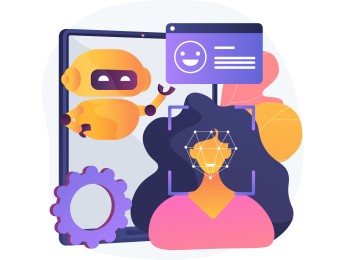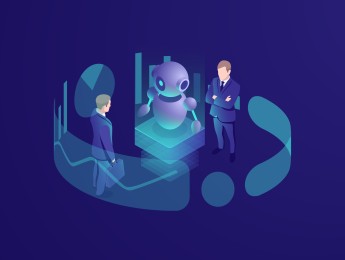Modern technologies are constantly making vast advancements in all areas, which greatly influences all industries that utilise them. One technology that has made extreme advancements in recent years is artificial intelligence.
Artificial intelligence is merging machine systems with data to create a process for functions for decision-making and problem-solving. Originally, AI was created to aid computer systems in their daily function, but it has been developed to be utilised in various situations and organisations. With the correct machine, AI can consistently learn through data collection and can become increasingly more intelligent as it works, often making it a vital asset within business’.
AI can create innovation for an organisation when the right system is established. Innovation was traditionally a management and leadership responsibility and was eventually merged with technology to evaluate decisions better. AI can almost completely erase the need for management, as it can create innovative ideas purely using data within the system, fully eliminating the probability of human error.
Upon completion of this course, participants will be able to:
- Define artificial intelligence (AI).
- Evaluate the areas in which artificial intelligence can be implemented.
- Assess the advantages and disadvantages of using AI.
- Identify the limitations of AI.
- Understand the importance of AI.
- Integrate the use of AI with innovation.
- Utilise AI innovation to improve an organisation's training, assessment and evaluation functions.
- Find the balance between AI and human influence within business functions.
- Analyse different methods and techniques for invoking innovation.
- Encourage innovative thinking within the workplace.
- Communicate effectively with employees to explain and encourage the correct use of AI.
This course is designed for anyone who wishes to integrate AI into their organisation, particularly those with control over innovation. It would be most beneficial for:
- Innovation Managers
- IT Professionals
- System Analysts
- Technology Managers
- Code Managers
- Project Managers
- Chief Technology Officers (CTOs)
This course uses a variety of adult learning styles to aid full understanding and comprehension. Participants will review a case study of an established business that effectively uses AI for process innovation to highlight key features.
Participants will participate in presentations, practical activities, and group discussions to ensure a thorough understanding of the taught content. They will also have ample opportunities to demonstrate the practical skills acquired through the use of an example AI system provided to them. This highly advanced system will allow participants to put the learned skills into practice under the guidance of experienced professionals in this field.
Day 5 of each course is reserved for a Q&A session, which may occur off-site. For 10-day courses, this also applies to day 10
Section 1: Introduction to Artificial Intelligence
- Defining artificial intelligence.
- Assessing the roles divided between man and machine.
- Evaluating where AI can belong within an organisation.
- Understanding where processes can be improved with the use of AI.
- Creating expert AI systems.
- The learning curve of an AI system and those monitoring it.
- Limitations of AI.
Section 2: Institutional Excellence
- The concept of institutional excellence.
- Methods of achieving sustainable excellence.
- The role innovation plays in maintaining excellence.
- Utilising the ‘Excellence Model’ for continuous improvement.
- Integrating AI and innovation for excellence.
- Identifying the current opportunities and creating action plans for achievement.
- Aligning business goals and objectives with market trends and industry standards.
Section 3: Applying AI for Organisational Improvement
- Reviewing examples of established AI models and their key factors.
- Data analysis and information mining in preparation for AI.
- Intelligent planning and stimulation.
- Smart training AI to perform a task or role.
- Intelligence assessment, evaluation and continuous monitoring.
Section 4: Innovation
- The vitality of innovation within an organisation.
- Urgent situations where innovation is required.
- The seven steps to achieving innovation.
- Developing SMART objectives.
- Creating action plans to implement innovative ideas.
- Using innovation to create AI system concepts.
- Using AI to create innovation further.
Section 5: Aligning AI with Innovation
- Reducing the probability of human error.
- The process of AI innovation.
- Communicating with employees and colleagues to build confidence with AI.
- Navigating change resistance.
- Evaluating the different types of AI and how each one can influence outcomes.
Upon successful completion of this training course, delegates will be awarded a Holistique Training Certificate of Completion. For those who attend and complete the online training course, a Holistique Training e-Certificate will be provided.
Holistique Training Certificates are accredited by the British Assessment Council (BAC) and The CPD Certification Service (CPD), and are certified under ISO 9001, ISO 21001, and ISO 29993 standards.
CPD credits for this course are granted by our Certificates and will be reflected on the Holistique Training Certificate of Completion. In accordance with the standards of The CPD Certification Service, one CPD credit is awarded per hour of course attendance. A maximum of 50 CPD credits can be claimed for any single course we currently offer.
- Course Code PI1-121
- Course Format Online, Classroom,
- Duration 5 days














